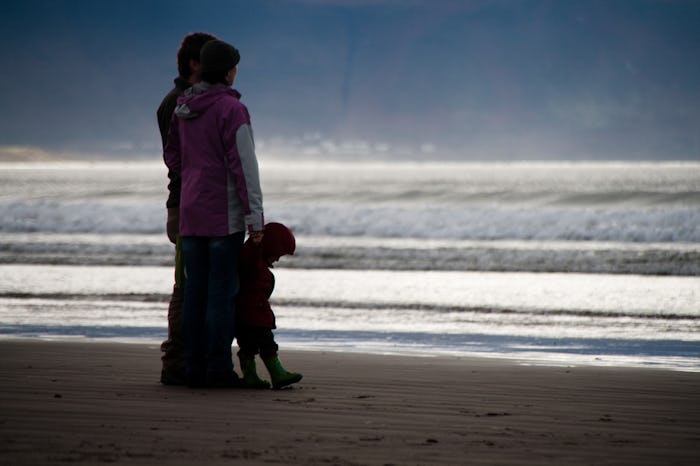Life

Why You Should Try Parenting Like The Irish
Ireland isn't one of those countries with particularly "wacky" parenting or birth customs. They don't send babies home in boxes or let them nap outside in their strollers in sub-zero weather (like some Scandinavian countries that shall remain nameless). However, but there are some parenting quirks that aren't so commonly known about the Emerald Isle. From getting paid per kid until they turn 18 to free prenatal care, these are more than a few things no one will tell you about Irish parenting, but I will.
I lived in Ireland for almost eight years, during which my husband and I weren't parents but every single one of our friends and family were. Thank goodness, because I got to see how that all went down before we actually became parents. The hardest thing to wrap my head around, as a kid-free outsider, was the fact that after you spent hours giving birth and have a little time to recover, you're moved to a maternity ward with up to eight women and their newborn babies. Eight, potentially screaming newborns all night long while you tried to recover from the equivalent of running a marathon? Yikes!
I never had the chance to give birth or start parenting in Ireland, as my husband and I moved to Houston to adopt in order to start our family. Part of me is very thankful that I avoided some of these Irish parenting quirks, but I also miss just a handful of them; like getting a monthly payment just for having a kid for, well, 18 years. Or the general pace of life that allows you to parent without as much pressure to choose the perfect parenting style (sometimes I even wonder if there are consciously different parenting styles in Ireland!) or put your child in 18 different extra-curricular activities before they're 7 years old.
You Get Paid
Unless you make millions, you likely qualify for the Child Benefit Allowance, a monthly payment per child that you'll continue to get until the child turns 18. It's designed to help pay for child related costs and clocks in at about $150 a month (and staggers down for each subsequent child).
Birth Is Free And So Is Prenatal Care...
From the moment you're pregnant, your health care is free until a period after you've given birth. You have regular (although less frequent than in the United States) check-ups and two ultrasounds, unless you have medical concerns that dictate more regular scans.
In Ireland, healthcare is broken into public and private, and everyone is entitled to public health care. If you want fancier care — private rooms or shorter wait times — you can pay for private health insurance, although you'll be using the same doctors just in different hospitals. If you choose a public maternity hospital, you won't pay a cent for your birth.
...But You Might Share A Room With Seven Women
Once your baby is born, you'll likely share a recovery room with five (or more) women who have also just given birth and their newborn babies. Newborns no longer get taken to nurseries, so long as they're healthy, so they all room in.
A Midwife Will Probably Deliver Your Baby
Many women in the United States are warming to the idea of having a midwife deliver their baby, but in Ireland it's the norm. Midwives deliver babies, although doctors are ready on the wing in case they are needed. Maternity hospitals also push medical intervention (pitocin and epidurals) much less frequently than in the United States, resulting in fewer cesarean sections.
Your Baby Will Have Visiting Hours
Even your partner will have to visit during visiting hours, and at any given time only two people will be able to visit at once. You pull a blue curtain around your bed to create privacy from the rest of the seven women and their visitors.
Once visiting hours are over it's just you and your newborn, with a whole bunch of other new moms and their newborns. Many of my friends have opted to be released as soon as 12 hours after delivery so they can go home and get some rest. Then again, I did have a few other friends with kids at home who considered the hospital stay a bit of a break. Ha!
Well Visits Come To You
When your baby is brand new, home health nurses come to the house to weigh and check on the baby, which means you don't have to bring the baby out into the world or into a doctor's office at one week or two weeks or even three weeks.
These home visits continue until your baby hits a certain age, and then you'll bring your child for well visits at the doctor much less frequently than in America, just at seven months and two years.
Breastfeeding Is Common, But Formula Is Cheap
Breastfeeding is really normalized and encouraged in Ireland, generally, but formula is also really cheap. Two great options for feeding your little one!
Laundry Takes Forever
Eight years living in Ireland and it still baffles me how laundry can take three times as long to wash as in the United States. Most people still dry laundry on racks next to a radiator, or on a line in the back yard. Most Irish tend to think dryers are a waste of electricity (but they are sold and we most definitely had one).
Life Is Slower
Maternity leave is nationally mandated, long, and most companies offer unpaid leave that can be tacked onto the end of it. The pace of life is generally a little slower, meaning easing into parenthood and actually taking time to enjoy it is much easier. Play dates and kid activities aren't expected to take up every minute of every day.